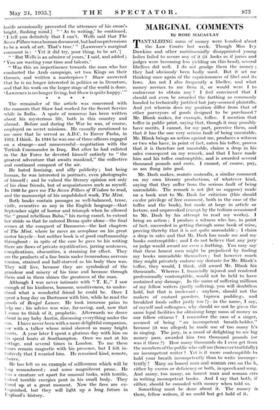MARGINAL COMMENTS
By ROSE MACAULAY
TANTALIZING sums of money were bandied about the Law Courts last week. Though Miss Ivy Dawkins and other matrimonially disappointed young ladies failed to secure any of it (it looks as if juries and judges were becoming less yielding on this head), several libellees did well. I do not grudge them the money ; they had obviously been badly used. But it set me thinking once again of the capriciousness of libel and its laws. Am not I also frequently a libellee, and what money accrues to me from it, or _would were I to endeavour to obtain any ? I feel convinced that I should not even be awarded the farthing so commonly handed to technically justified but jury-scorned plaintiffs. And yet wherein does my position differ from that of other purveyors of goods designed to be purchased ? Mr. Blank makes, for example, toffee. I mention that toffee in public print, saying that, though it may possibly have merits, I cannot, for my part, perceive them, and that it has the one very serious fault of being uneatable. Mr. Blank brings an action against me, produces a witness or two who have, in point of fact, eaten his toffee, proves that it is therefore not uneatable, claims a drop in his sales consequent on my remark, and that I have made him and his toffee contemptible, and is awarded several thousand pounds and costs. I cannot, of course, pay, so am flung into gaol.
Mr. Dash makes,•mutatis mutandis, a similar comment on my own literary productions, of whatever kind, saying that they suffer from the serious fault of being unreadable. The remark is not (let us suppose) made on a book sent to Mr. Dash for criticism (this should confer privilege of free comment, both in the case of the toffee and the book), but made at large in article or lecture, and unprovoked (except by the tedium occasioned to Mr. Dash by his attempt to read my works). I bring an action ; I produce a witness who has, in point of fact, succeeded in getting through some book of mine, proving thereby that it is not quite unreadable ; I claim a drop in sales and that Mr. Dash has made me and my books contemptible; and I do not believe that any jury or judge would award me even a farthing. You may say that these honest men might be prejudiced by finding my books unreadable themselves ; but however much they might privately endorse my distaste for Mr. Blank's toffee, they would, I think, still award Mr. Blank his thousands. Whereas I, financially injured and rendered professionally contemptible, would not be held to have sustained any damage. In the name of suffering millions of my fellow writers (justly suffering, you will doubtless hold, but that is irrelevant ; anyhow, should not the makers of custard powders, tapioca pudding;, and breakfast foods suffer justly too ?)—in the name, I say, of myself and colleagues, why should we not be given the same legal facilities for obtaining large sums of money as our fellow citizens ? I remember the case of a singer, accused of being " an incompetent breath-holder," because (it was alleged) he made use of too many h's in singing. The jury, in a mood of delighting to see big money pass, awarded him two thousand pounds (or was it three ?) How many thousands do I ever get from the members of the public who call me (however truthfully) an incompetent writer ? Yet is it more contemptible to hold your breath incompetently than to write incompe- tently? Many an honest man and woman errs on the h, either by excess or deficiency or both, in speech and song. And many, too many, an honest man and woman errs in writing incompetent books. And I say that both, if either, should be consoled with money when told so.
Something must be done about it. The money is there, fellow writers, if we could but get hold of it.














































 Previous page
Previous page